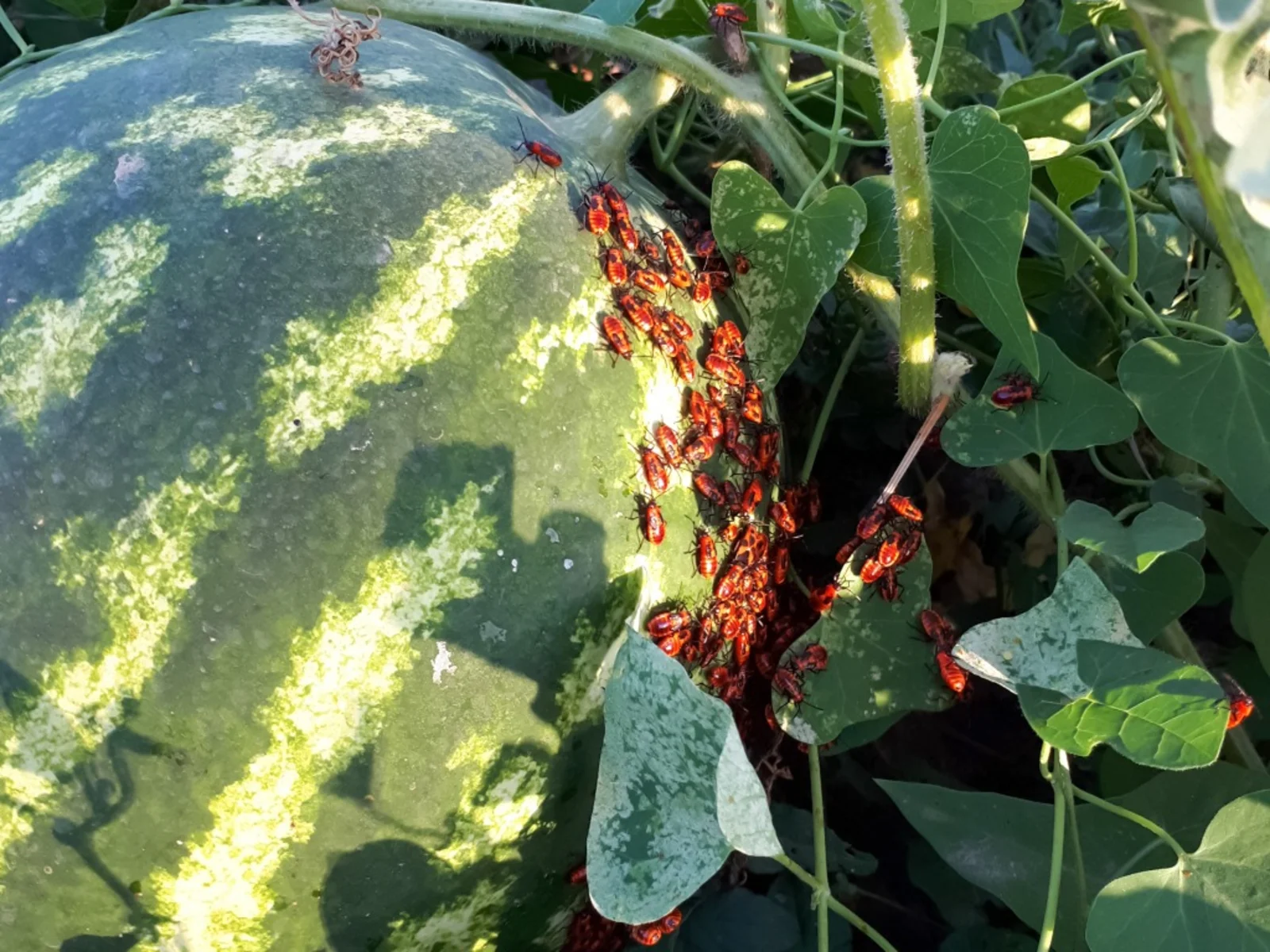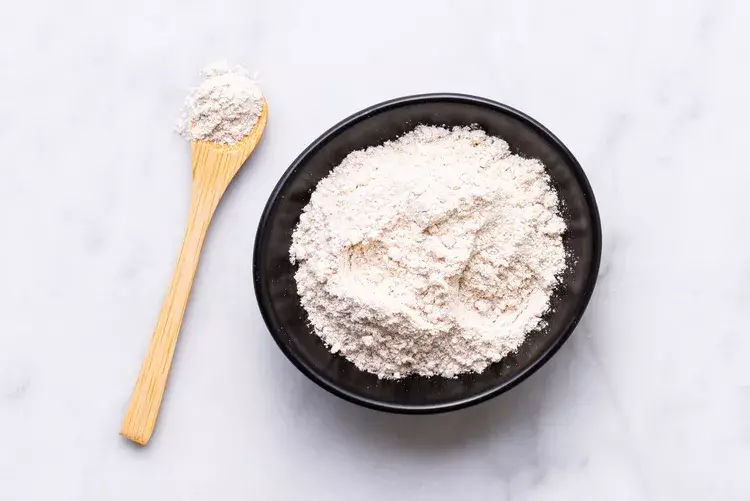Fruit gardens are commonly irritated by ants, which are one of the insects that annoy fruit trees.
So, why ants on watermelon plants?
Ants are often attracted to watermelon plants because of the sweet, sugary substance called honeydew. Ants can protect your watermelon from other pests. On the other hand, ants can also damage the plants by eating the leaves. You can remove ants from your watermelon plants by using white vinegar solution. You can also get rid of ants in your garden by sprinkling coffee.
Read the whole article to know the exact ways to use these methods. Besides knowing how to avoid ants, you’ll also learn tips and tricks for preventing them.
Why Ants Love Watermelon Plants
Watermelon plants may attract ants for a variety of reasons. The natural sugar in watermelon extracts, such as fructose and glucose, can attract ants since sugar is a source of energy for these creatures. Sometimes ants also eat vegetables like onion.

In fact, there are several factors that influence the level of attraction, including the concentration of sugar, the presence of competing food sources, and the type of ants present.
Watermelon plants can be attracted by ants when ripe or overripe watermelon extract is available since it contains a lot of sugar. Furthermore, watermelon extract has a sweet aroma which attracts ants because they are attracted to sugary foods. Then, the pollination of watermelon plants is also assisted by ants.
Impacts of Ants on Watermelon Plants
Having lots of ants in your watermelon garden is a kind of irritating situation of course. Ants can have both positive and negative impacts on watermelon plants. Let’s get to know both the positive and negative impacts.
Positive Effects of Ants on Watermelon Plants:
Though this kind of situation doesn’t seem helpful at all. It has some not harming rather benefiting impacts.
Protects from Other Pests: Watermelon plants can be protected from other pests, such as mites and aphids, by ant colonies. Consequently, these pests are fed on or protected from predators by these creatures.
Help to Aerate the Soil: Some species of ants can help to aerate the soil around the plant’s roots, which can improve water and nutrient uptake. However, ants are not responsible to create brown balls in soil.
Help to Pollinate: Also, Ants in the Watermelon garden can help to pollinate. It is necessary for fruit production that ants transfer pollen from male flowers to female flowers, which are attracted to the sweet nectar produced by watermelon blossoms.
So, pollination is so necessary for growing fruits. For example, if you bother about the pollination of cucumber plants with no male flowers, there are multiple ways to make teh pollination.
Harmful Effects of Ants on Watermelon Plant:
It’s time to learn what the harmful effects of having lots of ants in the watermelon garden are.
Disrupt the Roots: By tunneling through the soil, they can disrupt the roots and reduce the plant’s ability to absorb water and nutrients.
Attract other Pests: Ants can attract other pests, such as mealybugs and scale insects, which can further harm the plant.
Kills the Plant: Also, Ants can also feed on the watermelon fruit, which causes damage or even kills the plant in severe cases. Aphids blend into plants’ leaves, making them difficult to detect. Watermelon plants can be damaged by these pests because they extract nutrients from them.
Damage Plant’s Leaves: Ants such as leafcutters damage plant leaves by consuming them, which can destroy garden foliage and reduce crop yields. Photosynthesis is the process by which plants convert sunlight, water, and air into chemical energy. Due to this, the plant’s growth can be hindered by the loss of leaves.
Harm-Beneficial Insects: Watermelon plants can benefit from ants, but when they become too numerous or begin farming aphids on the plants, they can be a nuisance.
While some gardeners may resort to insecticides to manage ant populations, it’s harmful. Because this approach can have negative consequences for beneficial insects and pollinators.
So, When using insecticides, it’s crucial to exercise caution. And carefully follow the instructions provided by the manufacturer to ensure safe and effective use.
Nevertheless, if you’re looking for ways to eradicate the ants properly from your watermelon garden, the next section would be helpful for you.
4 Methods to Get Rid of Ants From Watermelon Plants
Eradicating ants from water from a watermelon garden may be important. Watermelon can attract ants to its sweet smell, and the fruit can be eaten by them.
Watermelon growth can be hampered by ant hills or mounds, which create air pockets that cause the soil to dry out more quickly. Let’s get to know the methods which can help you to eradicate them.
| Method | Required Materials |
| Vinegar Treatment | Vinegar and water |
| Coffee treatment | Coffee grounds |
| Diatomaceous earth treatment | Diatomaceous earth powder |
| Boric acid treatment | Borax-dipped cotton balls |
Only knowing the name of the methods doesn’t help you. So let’s get to know how you can apply them properly so that you can get rid of the ants from the garden.
Method 1: Vinegar Treatment
The strong smell of the vinegar can deter the ant colonies from the garden. All you have to do is mix the white water and apple cider vinegar.
Then fill a spray bottle with this solution. Finally, spray the mixture directly on the plants to keep ants away.
Method 2: Coffee Treatment
Coffee grounds can also act as a natural ant-repellent, similar to vinegar. Acidic compounds and caffeine present in coffee grounds make them repulsive to ants. Also, if you have Plumeria, it can be benefitted from that coffee grounds
It is believed that coffee grounds mask the pheromone trails used by ants to locate food when sprinkled on the soil. So, without using harmful chemicals, coffee grounds can reduce ant populations in a garden naturally.
You need to sprinkle brewed coffee grounds onto your garden soil. Its strong scent will discourage ants from residing in your garden.
Method 3: Diatomaceous Earth

Diatomaceous earth, or DE, is an organic and non-toxic substance that can be used as an insecticide to control garden ant infestations.
It is composed of the fossilized remains of marine phytoplankton, which may initially cause some hesitation, but it is actually a highly effective and safe method for repelling pests in your garden. DE is particularly effective for controlling ants.
Diatomaceous earth can be used as an insecticide to eliminate garden ant infestations by causing dehydration, but it’s crucial to keep the powder dry to ensure its effectiveness.
However, the product should only be sprinkled on the ground around ant mounds and mixed into the topsoil if possible, to avoid contact with flowers or leaves where bees may land.
Take care not to inhale any of it and use it on a still day. It is recommended that you use a spoon to apply it. Reapplication may be necessary after heavy rainfall.
Method 4: Boric Acid Treatment
It’s another fantastic method to get rid of ants in the garden. It’s a natural solution for killing ants is by using boric acid-based solutions. For this, you have to create an ant bait. Then mix a teaspoon and a half of borax with a half-cup of water and sugar.
Apply the mixture to the ant nests by soaking some cotton balls in it. Borax can be dangerous for humans and pets, so gloves should be worn when handling this mixture and hands should be washed immediately afterward.
Tips And Tricks to Prevent Ants from Watermelon Garden
As we all know Prevention is better than cure. So, if you don’t want to spoil your garden with ants, you can follow the tips and tricks given below.
- You can place mint and cinnamon-flavored gum at the base of the plant or you can sprinkle cinnamon around it.
- You can apply a combining borax and sugar in equal proportions and spread the mixture at the plant’s base. The ants that consume this concoction will perish.
- The mixture of cornmeal and sugar also works fantastic to prevent ants. The ants will eat the mixture, and the cornmeal will expand inside them, leading to their demise.
- You can make a trap for ants. An 8-inch (20.5 cm) diameter circle can be cut from paper to form a collar to trap ants. In the middle of the circle, cut a small hole that can loosely fit around the plant’s base. Now, coat one side of the paper collar with Vaseline. The Vaseline side should be facing upward when the collar is placed around the base of the plant. Therefore, Vaseline will trap ants.
- Plants like henbit, geranium, garlic, aster, calendula, chrysanthemum, and mint are natural repellents for ants and other common garden pests. Keeping ants at bay can be achieved by planting these species strategically near affected plants.
By implementing these tips, you can expect to bid farewell to your ant issue in no time and relish the pleasure of having a garden free of ants.
Frequently Asked Questions (FAQs):
Is there a fast way to get rid of ants?
Yes, using white vinegar is the fastest method of getting rid of ants. It is possible to eliminate ants on contact by saturating their trails that spray counters and other areas, wiping them after a few minutes, or letting the treatment dry.
What fruits are poisonous to ants?
Fruits like Lemon, Orange, and Grapefruit are poisonous to ants. The peels of these fruits contain d-limonene, an acidic oil that is toxic to ants. Live ants can also find it difficult to locate food sources due to the disruption of their scent trails.
Does salt get rid of ants?
Salt offers a temporary reprieve for certain ant species rather than effectively killing them. Because ants typically live in large colonies containing thousands of individuals, they tend to live in larger colonies.
Conclusion
Hopefully, you’ve got to know what to do when ants on watermelon plants. You may find growing watermelons in the garden fascinating, but you may encounter several disturbing issues.
Among them are the ants that spread over the garden. After reading this article, you will learn how to eradicate ants from your garden with wonderful methods. If you still can’t get over the situation, ask for help from professionals.
Wish you luck with your venture!
- Why Are There Still No Tomatoes in My Tomato Plants? Let’s Fix the Issue! - July 13, 2023
- Water Propagation White Stuff on Roots: Everything You Should Know! - July 11, 2023
- String of Dolphins Drying Up: Solved! - July 11, 2023
